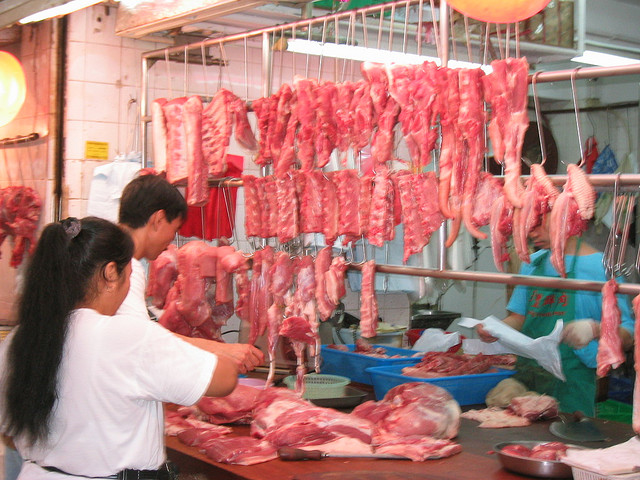Why Buying at a Local Meat Market Guarantees Fresh, High-Quality Cuts
Purchasing at a neighborhood meat market provides unique benefits that often go unnoticed by customers accustomed to larger retail chains. The implications of picking neighborhood expand beyond immediate benefits, triggering a closer exam of what this option absolutely means for both consumers and the local economic situation.
Benefits of Regional Sourcing
In the world of food procurement, the advantages of neighborhood sourcing stand out plainly. By acquiring meat from local markets, consumers get direct access to products that are commonly fresher and extra savory than those found in larger, commercial grocery stores. Regional sourcing reduces the time and range food takes a trip from ranch to table, which not just boosts preference yet additionally preserves dietary worth.

Furthermore, regional sourcing often offers transparency concerning the origins of the meat. Consumers can ask about the farming practices made use of, animal welfare standards, and whether the meat is grass-fed or organic. This details encourages customers to make educated choices aligned with their values.
High Quality Control Requirements
Neighborhood meat markets frequently comply with strenuous high quality control criteria that make certain the products supplied fulfill high security and freshness criteria. These standards commonly incorporate different phases of the meat production process, from sourcing to taking care of and storage space.
First, neighborhood markets typically establish rigid provider requirements, ensuring that just reputable farms and producers are made use of - bagley meat market edwardsville il. This lowers the chance of contamination and advertises greater animal welfare criteria. Additionally, several local meat markets execute regular assessments to confirm that the meat is refined under hygienic conditions, further reducing wellness threats
Temperature level control is another important aspect of quality control. Neighborhood meat markets often check refrigeration systems to keep optimal storage space temperatures, guaranteeing that meat continues to be fresh and secure for consumption. The application of traceability systems enables markets to track the beginning of their items, providing openness and responsibility.
Lastly, team at neighborhood meat markets are usually educated to identify indicators of wasting and understand correct handling methods. This dedication to top quality control not only boosts the general requirement of the meat but additionally promotes consumer trust, making local meat markets a dependable resource for top quality cuts.
Sustaining Local Farmers
Sustaining local farmers is essential for fostering a sustainable food system and boosting neighborhood durability. They directly contribute to the incomes of farmers in their region when consumers select to go shopping at regional meat markets. This not only sustains the regional economy yet additionally reinforces the farming industry, ensuring that it remains feasible and vibrant.


Furthermore, supporting regional farmers cultivates a feeling of area and connection between manufacturers and consumers. It motivates openness in food sourcing and instills depend on, as clients can create relationships with the people that increase their food. This straight connection inevitably results in an extra involved and notified public, which is essential for advocating for lasting agricultural techniques in the future.
Lasting Practices
Sustainable techniques in meat markets play a crucial role in promoting environmental stewardship and making certain pet welfare. Neighborhood meat markets typically focus on sourcing their products from ranches that execute ethical and lasting farming techniques. These methods include rotational grazing, which aids maintain soil health and wellness and minimizes carbon emissions, alongside lessening making use of anti-biotics and hormones in animals.
Additionally, regional meat markets commonly highlight openness in their supply chains. Consumers are supplied with information relating to the beginning of their meat, enabling them to make educated options that line up with their worths. By supporting local farmers who exercise lasting techniques, customers add to the preservation of biodiversity and the reduction of transportation exhausts related to long-distance meat circulation.
In addition, numerous regional meat markets take part in waste reduction approaches, such as utilizing every part of the pet and advertising off-cuts that might or else go unsold. By promoting a much more lasting method to meat consumption, these markets not just give high-grade products but additionally contribute positively to the setting and animal welfare. Basically, purchasing at a local meat market lines up customers with a wider activity towards honest and responsible food sourcing.
Individualized Customer Care
Shopping at a meat like this market frequently encompasses even more than simply the products provided; it is also concerning the experience and the partnerships built in between clients and team. Customized client service is a trademark of local meat markets, establishing them in addition to larger grocery chains. Educated personnel put in the time to recognize private customer preferences, making sure that each see is customized to particular requirements.
Consumers gain from experienced suggestions on cuts, food preparation approaches, and prep work pointers, cultivating a feeling of count on and commitment. This customized interaction allows customers to ask questions and seek recommendations, resulting in informed acquiring choices. Personnel typically keep in mind regular clients and their preferences, developing a welcoming environment that cultivates neighborhood ties.
Furthermore, personalized service reaches unique requests, such as personalized cuts or certain prep work methods, which larger sellers might not suit. This level of interest strengthens the commitment of local meat markets to top quality and client fulfillment.
Fundamentally, personalized client service not only improves the purchasing experience but likewise makes certain that customers go now entrust to the very best products matched to their culinary requirements, making every check out a gratifying one.
Conclusion
Supporting regional farmers fosters community partnerships and enhances the neighborhood economy, while lasting practices contribute to ecological stewardship. Additionally, personalized client service enhances the purchasing experience, making local meat markets a recommended option for consumers seeking both top quality and honest factors to consider in their food sourcing.
The implications of choosing local extend past immediate advantages, triggering a closer evaluation of what this option genuinely suggests for both consumers and the regional economy.
Supporting regional meat markets additionally adds to the local economic climate. Neighborhood meat markets frequently monitor refrigeration systems to keep ideal storage space temperature levels, guaranteeing that meat remains fresh and secure for consumption.Neighborhood farmers are commonly much more attuned to the details demands of their areas, elevating and growing crops livestock that straighten with local tastes and preferences. Sustaining regional farmers promotes community relationships and enhances the regional economic climate, while lasting methods add to ecological stewardship.